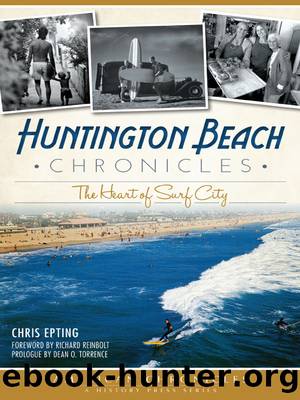Huntington Beach Chronicles by Chris Epting

Author:Chris Epting
Language: eng
Format: epub
Publisher: Arcadia Publishing Inc.
Published: 2014-09-15T00:00:00+00:00
Leroy Jauman poses next to the house when he was born, in front of which stand the special palm trees.
For that, heâd pocket fifteen centsâa Depression-era bounty for an eight-year-old.
Kery Beason, who lives in Jaumanâs house today with her children, kindly let us visit in the backyard, where we compared a vintage image of the same spot. Jauman showed us where the sweet peas once flourished, next to where he grew black grapes in a small orchard.
Then he regaled us with memories of fearlessly climbing oil derrick towers with his friends, wandering the vast vacant lots and catching soft-shell crabs near the pier. They could fetch ten cents a dozen for the crabs during the Depression, and then the youths would spend the day jumping off the pier, which was allowed back then until an inexperienced âflatlander,â as Jauman called him, was injured and his family sued the city. The kids also spent many hours riding the heavy wooden âbelly boardsâ they made in shop class at Huntington Beach High School.
Several days later, I had the privilege of joining Jauman and a handful of his high school classmates, HBHS class of â42, who meet regularly at a local Marie Callenderâs. âOur group is shrinking,â he said bittersweetly, showing me a contact list with many crossed-off names. But it doesnât dull the laughs and reminiscing that take place around the table.
Along with Jauman, Ray Walker, Cliff Clemens, Joanne Moore, Jean Parent and Rosemary Robinson all shared evocative local stories from the past.
âWe had a war going on when we graduated,â said Walker. âWe didnât worry about college.â
âOur generation had to grow up quickly,â added Clemens. âWithin a year, we were facing the enemy.â All the men at the table enlisted. Clemens was held as a prisoner of war in a German camp.
They told me how military personnel in Huntington Beach back then were revered. Meals were provided, rides were given and over-the-top appreciation was the norm. âA serviceman wouldnât have to stand five minutes on the street before being offered whatever he might need,â said Walker.
The group talked about long-gone neighborhoods and businesses, like the Green Shack, a down-and-dirty burger joint on the outskirts of town past the high school near the old tile factory where oil workers would frequent. They remembered dancing at the Golden Bear in the 1940s and then doing the âBalboaâ dance at the Pavalon Ballroom adjacent to the pier, where famed composer and conductor Stan Kenton would sometimes perform (along with a local orchestra, the Esquires).
And they reminisced about lazy days swimming in the sea after sunning on the old wooden pier. Did you know that back in the 1940s, a shuttle boat from the pier would putter out about a mile offshore to a barge where you could sit and fish all day? It cost fifty cents round trip, and Clemens said that if you left early enough in the morning, by noon you had all the fish you could have wished for.
The boys all
Download
This site does not store any files on its server. We only index and link to content provided by other sites. Please contact the content providers to delete copyright contents if any and email us, we'll remove relevant links or contents immediately.
| Americas | African Americans |
| Civil War | Colonial Period |
| Immigrants | Revolution & Founding |
| State & Local |
In Cold Blood by Truman Capote(3368)
The Innovators: How a Group of Hackers, Geniuses, and Geeks Created the Digital Revolution by Walter Isaacson(3121)
Steve Jobs by Walter Isaacson(2883)
All the President's Men by Carl Bernstein & Bob Woodward(2361)
Lonely Planet New York City by Lonely Planet(2206)
And the Band Played On by Randy Shilts(2183)
The Room Where It Happened by John Bolton;(2143)
The Poisoner's Handbook by Deborah Blum(2126)
The Innovators by Walter Isaacson(2095)
The Murder of Marilyn Monroe by Jay Margolis(2088)
Lincoln by David Herbert Donald(1979)
A Colony in a Nation by Chris Hayes(1915)
Being George Washington by Beck Glenn(1881)
Under the Banner of Heaven: A Story of Violent Faith by Jon Krakauer(1787)
Amelia Earhart by Doris L. Rich(1684)
The Unsettlers by Mark Sundeen(1679)
Dirt by Bill Buford(1665)
Birdmen by Lawrence Goldstone(1656)
Zeitoun by Dave Eggers(1636)
